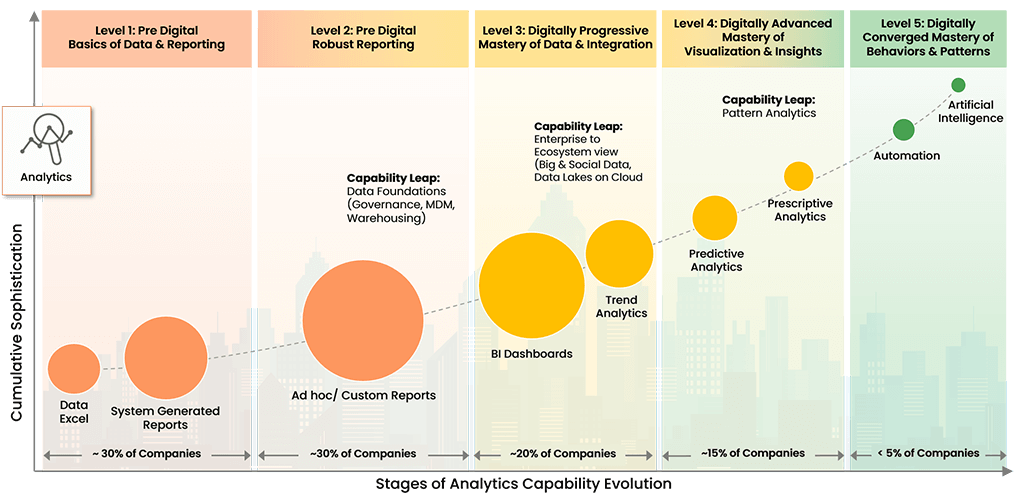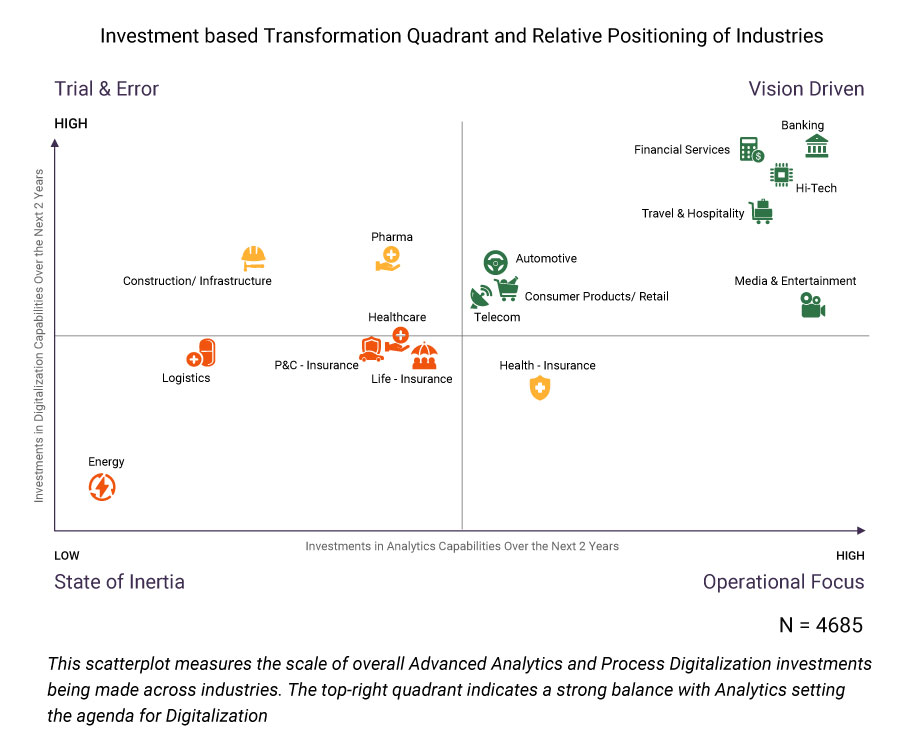Digital-First Retail Firms Lead the Charge
The retail industry is a melting pot of digital innovation. This is due to the high prevalence of
enterprise-level digital transformation, where market competition is driving
continuous innovation across retail product-service portfolios. Private equity and venture
capital firms are supporting new disruptors to rapidly develop and deploy their products and
services in the cloud, with data-driven processes that augment and improve the customer experience
(CX).
Incumbents can no longer rely on reputation and brand image, with a loss of product momentum
resulting in a feedback loop of lost sales and widespread customer exodus. Retail industry players
must be aware and remain sensitive to the changing status quo, leveraging technology and data-driven
business models to remain competitive.
Only 7% of Companies Are Delivering on Their Transformational Initiatives
Our research has shown that 30% of companies will fail to survive this decade due to an inability to
evolve digitally. To address this negative trend, we have developed the Digital Enterprise Evolution Model™ (DEEM).
Digital Enterprise Evolution Model™

Copyright © 2022 Trianz
DEEM allows our clients to recognize digital evolution patterns, implement benchmarking and
prioritization strategies, and initiate application management protocols to satisfy stakeholder and
market requirements.
Reimagining the Retail Customer Value Proposition
The retail industry is in the midst of a reimagining of the customer value proposition. This necessitates
comprehensive analysis of customer sentiment for retail firms to be able to make the right business
decisions. As product-service lifecycles grow shorter due to rapid innovation, e-commerce disruptors are
well-positioned to absorb heightened demand among consumers. Additionally, retail firms are losing their
place in the value chain as manufacturers adopt direct-to-consumer (D2C) sales models. This necessitates
action from incumbents, delivering new value to preserve their place in the retail chain.
Digital-first retail companies use technologies like the cloud, artificial intelligence (AI) and machine
learning (ML), as well as automation with flair to outcompete incumbents. Venture capital support also
enables net-loss operations in the short-to-midterm, growing the customer base at the expense of
profitability. This allows for disruptors to shift and add new product-service portfolio items, as well
as adjust prices to leverage this new customer base.
Great risk comes with the potential for great rewards, and incumbents are hesitant to take these risks.
These legacy firms must invest in digitalizing their operations to remain competitive and retain
industry leadership. Interconnected product experiences and acomplete
transformation of the value chain will be essential.
Vision-Driven Retail Strategies Leave Little Room for Error
For retail firms that reside outside the vision-driven quadrant, there is a lack of urgency around
digital transformation. These firms may digitalize certain aspects of their operations in a fragmented
manner, but even then, sub-optimal execution is undermining the value of these initiatives. This
highlights the need for end-to-end digital transformation strategies that encompass all areas of the
business for retail players.
Around half of retail companies are planning significant investments in cloud technologies, creating a
digital foundation equipped to support new technologies and approaches across their wider operations.
Retail firms also report investments in advanced analytics functionality and robotic process automation
(RPA), driving greater efficiency and cost-reduction to compete in the digital era. For retail
incumbents, digital transformation is fast becoming a mandatory process to remain relevant in the face
of digital disruption.
Research and Development Is Raising the Retail Bar
The retail industry is aligning more closely with the high-tech industry in terms of research and
development. Research and development is a significant area for retail companies, with digitalization in
the context of process digitalization and robotic process automation (RPA) being the focus. Advanced
analytics will also play a huge part in generating insights to guide retail business decisions, with
significant investment across the industry already taking place.
For retail incumbents, this increases the urgency for vision-driven digitalization of the product-service
portfolio and underlying business operations. For retail firms who fail to digitalize and consequently
sit outside the vision-driven quadrant, there is a significant risk of being forgotten in favor of new
digital disruptors.
Experience the Trianz Difference
Trianz enables digital transformations through effective strategies and excellence in
execution. Collaborating with business and technology leaders, we help formulate and execute
operational strategies to achieve intended business outcomes by bringing the best of
consulting, technology experiences and execution models.
Powered by knowledge, research, and perspectives, we enable clients to transform their
business ecosystems and achieve superior performance by leveraging infrastructure, cloud,
analytics, digital and security paradigms. Reach out to get in touch or learn more.



















